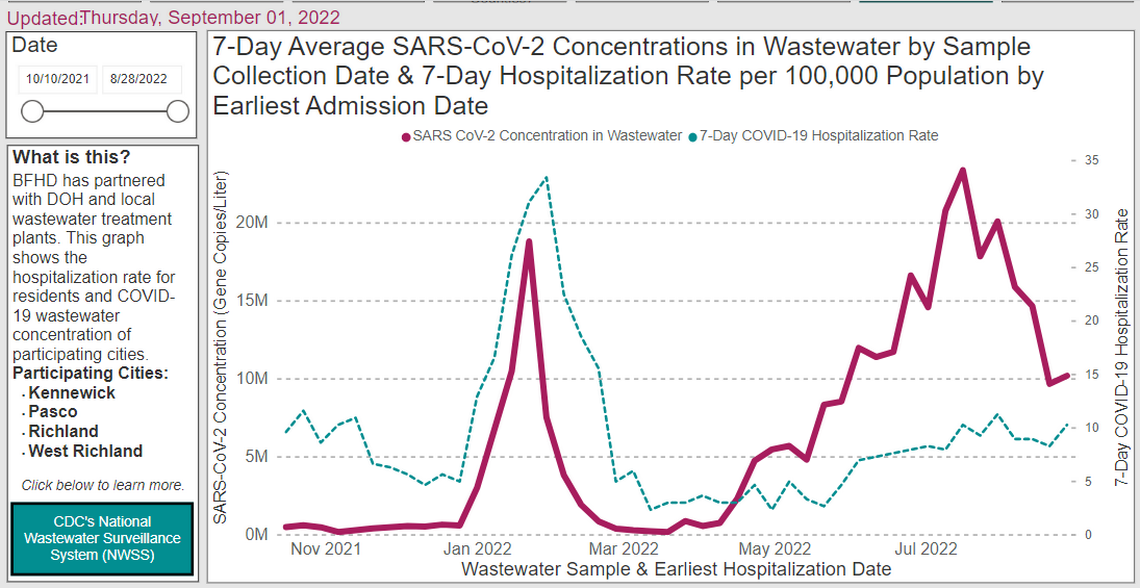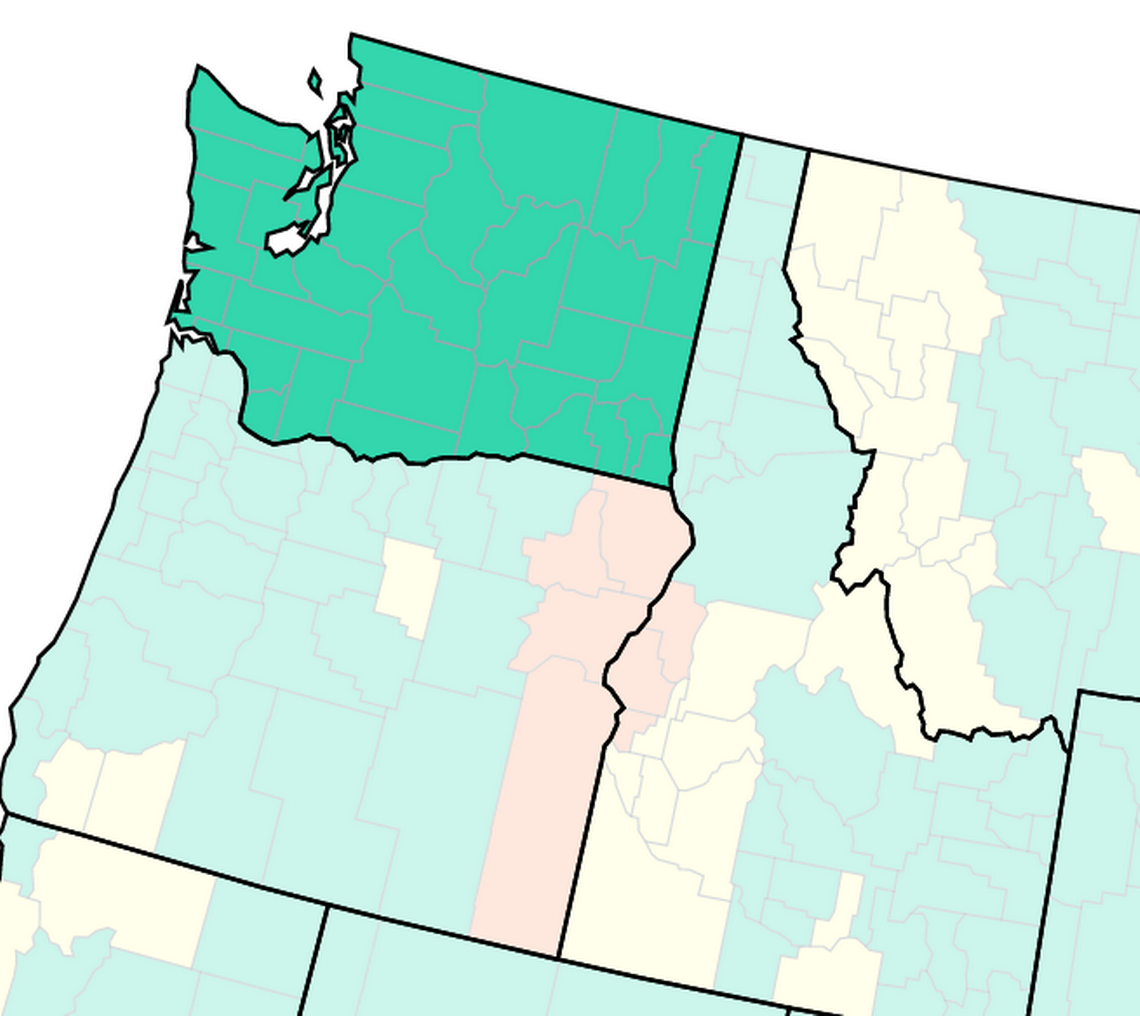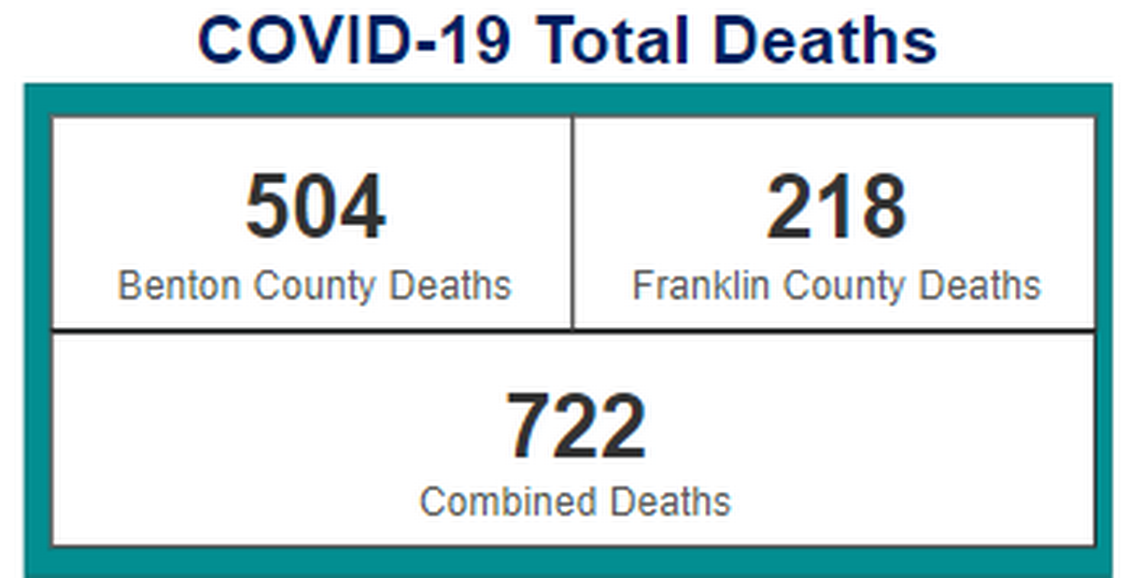4 more die and long COVID remains a problem. New booster arrives in Tri-Cities
The Centers for Disease Control and Prevention has given the entire state of Washington a COVID-19 community level rating of “low.”
But don’t get complacent, warned Heather Hill, infectious disease supervisor for the Benton Franklin Health District, speaking last week on the Kadlec on Call podcast.
“It is more than the common cold,” she said. “We continue to see two to three deaths a week from this virus.”
In fact, four more residents of the Tri-Cities area have died of complications of COVID-19, according to the Benton Franklin Health District’s latest weekly update.
And long COVID — long-term health problems from infection that may last for weeks, months or longer — continues to be a concern, said Dr. Jeff Duchin, health officer for Public Health — Seattle & King County, in a news briefing last week.
Those most likely to be hospitalized or die are older, unvaccinated and have underlying medical conditions, but long COVID is seen across a larger range of ages, he said.
An estimated 5% to 40% of people who are infected with the coronavirus develop long COVID, he said.
The wide variety of reported long COVID symptoms — including fatigue, a fast-beating heart, brain fog, joint or muscle pain and rash, which could come from other health conditions — can make diagnosis of long COVID difficult, according to the CDC.
People who are vaccinated against COVID-19 are less likely to have long COVID, according to the CDC.
COVID vaccine booster
The first shipments of the new and updated omicron-targeting booster arrived in the Tri-Cities last week.
Some doses were sent to the health district to distribute to medical providers and others were shipped to pharmacies.

The new booster has been released as the United States moves toward a system similar to that for flu vaccines, with a booster dose of the COVID-19 developed to be given annually that targets specific strains of the coronavirus expected that year.
The flu shot can be given at the same time as the COVID-19 booster.
Visit Vaccine Locator or call the COVID-19 Information Hotline at 1-800-525-0127 to check for places that have doses of the new booster.
Before people may get it, they must have their initial COVID-19 vaccinations — currently two doses of the Moderna or Pfizer vaccine.
The new booster made by Pfizer is available for people 12 and older and the new booster made by Moderna is for people 18 and older.
The booster should be given no sooner than two months after the latest vaccine dose.
The original booster will no longer be given to people ages 12 and older, but will continue to be the booster for children ages 5 to 11.
Tri-Cities COVID cases
Confirmed COVID-19 case rates in the Tri-Cities area have peaked and are trending downward, according to the just released Unified Situation Report for August COVID activity from the Benton Franklin Health district and Benton and Franklin counties Emergency Management.
The latest case rate for Benton and Franklin counties combined was about half of what was reported a month ago, down to 120 new cases per 100,000 people in a week.
The hospitals in Richland, Kennewick, Pasco and Prosser reported 32 people hospitalized in a week for COVID-19 treatment, the same as they reported a month ago.

Hospitals are not overwhelmed, but report being stressed due to treating patients who need high levels of care and high levels of staff absenteeism and employee turn over, according to the situation report.
Fewer people are coming to the free drive-thru COVID-19 testing site at Columbia Basin College of Argent Road in Pasco, but the site still tested 435 people in the week that included the last days of August and the first days of September, Hill said.
The rate of positive test results remained high at 37.5%.
One of the most accurate ways of determining how prevalent the coronavirus is in the Tri-Cities area is checks of untreated municipal wastewater for the virus’s genetic material.
Levels of coronavirus in wastewater in Richland, Kennewick, Pasco and West Richland significantly decreased in August. Since then, a modest increase has been detected, but levels remain at less than half of earlier this summer.
CDC COVID ratings
Although the CDC gives every county in Washington state a community COVID-19 level of “low,” neighboring states have many counties with significant levels of COVID.
Oregon still has four counties rated as ‘high” and three as “medium.” Idaho has two counties rated as “high “and 10 rated as “medium.”

The CDC bases its COVID-19 community level ratings not only on new case rates, but also hospital beds used by patients with COVID and hospital admissions for people with the disease.
When the community level is “high,” masks are recommended in indoor public spaces, and when they are “medium” those at high risk of serious illness should wear masks. No recommendation is made on masks when community levels are “low.”
Tri-Cities COVID deaths
The four most recent deaths due to COVID-19 in the Tri-Cities included a Benton County man in his 40s.
The other three deaths were people at increased risk of death from the disease due to their age. They were Benton County men in their 70s and 80s and a Franklin County woman in her 90s.

Deaths of Tri-Cities area residents since the start of the pandemic now total 722, including 504 Benton County residents and 218 Franklin County residents.
In the Tri-Cities, local public health officials verify that deaths are due to COVID complications by checking for a positive test result and that a coronavirus infection was named as a primary cause of death on the death certificate.
It can take several weeks for the health district to receive and reconcile death information due to the reporting processes of medical facilities and coroner offices and the process of issuing and releasing death certificates.
Tri-Cities nursing homes
In the Tri-Cities, nursing homes and other group homes for elderly adults, are a particular concern, according to the situation report.
There were nine outbreaks in long-term care facilities last month and six facilities were on a watch list.
“Low booster rates among residents and staff continue to create additional risks to residents in these elderly congregate settings,” the report said.
The group homes also are seeing rapid turnover of staff at every level, and incoming staff have limited infection control training and skills, it said.
In addition to the outbreaks in long term care facilities, August ended with one outbreak in a business and three other business outbreaks being investigated.
With school just started for the year, public health officials are seeing some teacher and staff cases, and public health officials are waiting to see of that spills over into classrooms, Hill said.
This article has been corrected to say people who are not vaccinated are more likely to get long COVID.
